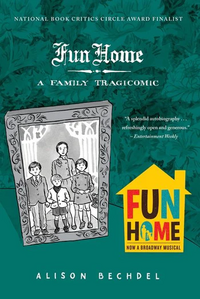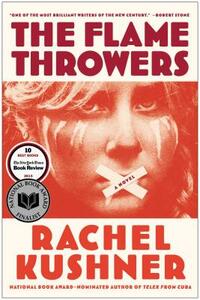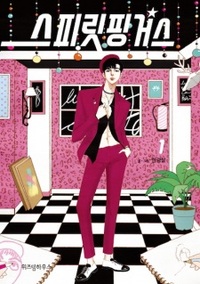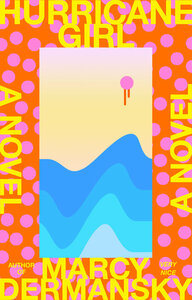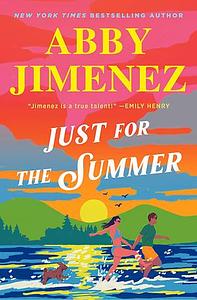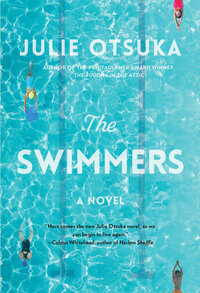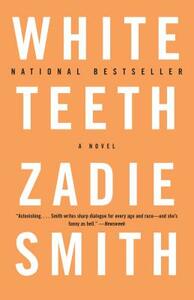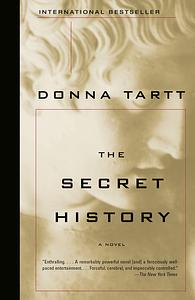Take a photo of a barcode or cover
documentno_is's Reviews (1.29k)
dark
emotional
funny
hopeful
informative
reflective
sad
fast-paced
At first I wondered if the telling of this narrative as a comic rather than simply in text wasn’t an act of cheapening what is mostly serious subject matter ( as much as Bechdel suggests this is a comedy I can’t quite grasp any humor outside of comedy in a literary sense.) However, by the third act I had largely adapted to the comic delivery and find myself along for the ride in Bechdel’s musings which are often insightful, damning, and extremely referential. Some references are pervasive, and some are as simple as showing Bechdel masturbating to Delta of Venus by Anais Nin. In this autobiography Bechdel uses Fitzgerald and Camus most often as jumping off points as connections to her father as well as paralleling their stories with her autobiographical source material in theme and literal plot.
Much of the novel is gut-wrenching, the way Bechdel infuses her lived experience with the story of the contrast of her closeted father both enlivened and breaks down the narrative. Bechdel acknowledges that this chronicle of her father’s history is almost all supposed- as in his death she can no longer ask him. One of the most gripping moments throughout was when Bechdel and her father sit in the car on the way to the movie- the reader knows with great sadness (but a complicated sadness of course) that her father will be dead soon but we watch Bechdel’s first attempts to connect to her father in his entirety not just as a parent but as a gay man to a gay daughter. The reader is stricken by the lack of resolution and Bechtel’s comparison of them to characters in Ulysses is apt.
Much of the underlying interest that drew me into this comic was the inclusion of gender discourse in the explicit expression of sexuality and how those agencies relate. Societally we are at a place where we are asked consistently (at least in an academic perspective) to view gender (and its expression) and sexuality through separate but related lenses but sometimes in individuals (such as in the case of Bechdel but also transparently in the case of myself) the actual expression of gender alludes more to sexuality than anything else. Discovering masculinity as a way to signal identity in oppressive spaces is a formative early queer experience and it was validating to read this experience (maybe for the first time) in what is largely a critically acclaimed popular novel. The experience of reading Fun Home was a satisfaction of an eventuality. I’d long heard of Bechdel’s thoughts and seen many excerpts from comics of hers (many of which back in the days of Tumblr) so I was glad to finally engage in material I’ve always existed adjacent to.
Much of the underlying interest that drew me into this comic was the inclusion of gender discourse in the explicit expression of sexuality and how those agencies relate. Societally we are at a place where we are asked consistently (at least in an academic perspective) to view gender (and its expression) and sexuality through separate but related lenses but sometimes in individuals (such as in the case of Bechdel but also transparently in the case of myself) the actual expression of gender alludes more to sexuality than anything else. Discovering masculinity as a way to signal identity in oppressive spaces is a formative early queer experience and it was validating to read this experience (maybe for the first time) in what is largely a critically acclaimed popular novel. The experience of reading Fun Home was a satisfaction of an eventuality. I’d long heard of Bechdel’s thoughts and seen many excerpts from comics of hers (many of which back in the days of Tumblr) so I was glad to finally engage in material I’ve always existed adjacent to.
Graphic: Suicide
adventurous
challenging
dark
funny
informative
mysterious
reflective
sad
tense
fast-paced
Plot or Character Driven:
A mix
Strong character development:
Yes
Loveable characters:
Complicated
Diverse cast of characters:
Yes
Flaws of characters a main focus:
Yes
There are a variety of interconnected stories in the flamethrowers and ill be trying to look at them both in isolation and unity.
Reno
Reno is an incredibly sympathetic protagonist, but I never found her pitiable. She is too young to experience what she does, and the men she surrounds herself with take advantage of her and then resent her for letting them. Meanwhile she tries to reclaim some power, and what results is story. Reno is also early on used as a tool to show us what women are allowed in these worlds. What they have to face and what they have to suffer- it is not enough to acknowledge 'ah yes they were oppressed' you had to look to others in ways to free yourself and potentially end up damning yourself to pain in the end.
(Older & Younger) Valera
The Motherfuckers
The book in general
The book has a visual quality to it, outside of literally being peppered with inspirational images the prose is very visual, it is sometimes more concerned with *the scene* than what lays behind it. Sometimes there is this feeling that the author is setting up a visual play, and the reader is guided where to look scene by scene. Some scenes that really rang this true was Ronnie observing the protagonist, or when Sandro cheats on her in the Valera plant.
Made to burn. A running theme, and the through line of the novel. The Motherfuckers attempting to burn it all down. The literal burning of rubber, manufacturing and riding motorcycles. The violence of war. The burning of self, faced with one's past.
The role of women
The women in this book are oppressed, the author is clear about wanting us to see this and every interaction with a man reminds of this. The women can choose, to use this oppression to their advantage in some way or to remain in subservience. They are not respected and they are dismissed. The novel largely surrounds the 70’s art world and canonically it was, as most eras of art, completely dominated by men so I found this appropriate for the storytelling.
History
It was clear that Kushner finds more importance in the storytelling of The Flamethrowers than the historical accuracy, and almost ironically jokes about this throughout the novel in snippets surrounding “the things Ronnie says don’t have to be true.” The importance of the telling in conceptual art, when sometimes the telling is moreso the art than whatever physical manifestation is left behind. Lying is fine as long as the story is interesting, and everything is done for the plot. This artistic is a movement, both against fascism but contrastingly it can’t be because it is also bourgeois. The lies that matter and the lies that don’t largely depend on the context of the situation and the novel presents us with various examples.
The lies that don’t matter: The phoniness and veneer of the art world, the stories that people construct of themselves
The lies that matter: when engaging in revolutionary political act, when cheating (?)
The novel has a nice push and pull between this idea of veneer and reality, of innocence and maturity, of choosing to believe or choosing to not see.
The lies that don’t matter: The phoniness and veneer of the art world, the stories that people construct of themselves
The lies that matter: when engaging in revolutionary political act, when cheating (?)
The novel has a nice push and pull between this idea of veneer and reality, of innocence and maturity, of choosing to believe or choosing to not see.
The novel largely is concerned with the events in NYC and Italy (Milan, Rome) in the ‘60s and how those two locations related to one another. Reading Kushner’s afterword about naked women and guns while also having read the defining modernist essay by Clement Greenberg one can start to place this novel in time and place. The setting of NYC with the parties so mentioned, knowing Andy Warhol is beginning to create pop art while purists like Serra rely on fervent masculinity a la Pollock to create and sell work. I think we are meant to draw many parallels between Serra and Valera specifically. In this way I also can appreciate this novel as a sort of abstract expressionist fan-fiction. I love the way Kushner uses historical knowledge of the reader to enhance the work, but is completely willing to change aspects of the story to suit the novel’s needs.
Conclusion
I found the Flamethrowers incredible, memorable, and sympathetic. I appreciated already having the art history knowledge to guide me in reading.
funny
hopeful
lighthearted
medium-paced
Plot or Character Driven:
Character
Strong character development:
Yes
Loveable characters:
Yes
Diverse cast of characters:
No
Flaws of characters a main focus:
Yes
challenging
funny
reflective
sad
fast-paced
Plot or Character Driven:
A mix
Strong character development:
No
Loveable characters:
Complicated
Diverse cast of characters:
Yes
Flaws of characters a main focus:
Yes
Nice story about a person regaining their power and control after having it stripped away, narrative structure was interesting but nothing too special otherwise.
fast-paced
Plot or Character Driven:
A mix
Strong character development:
Yes
Loveable characters:
Complicated
Diverse cast of characters:
N/A
Flaws of characters a main focus:
Yes
I think I disagree with the fundamental messaging and themes of this novel, and it was kind of poorly written. Nothing heinous though.
challenging
reflective
sad
fast-paced
Plot or Character Driven:
A mix
Strong character development:
No
Loveable characters:
Yes
Diverse cast of characters:
No
Flaws of characters a main focus:
N/A
As a recommendation:
The first half of this novel acted as a perfect subway read, interesting and complex in structure but thematically easy. It was written in a way to be picked back up and put down again. If you're looking for something simple to carry around this is a great book for that.
So, my more in depth review in parts:
The first half of this novel acted as a perfect subway read, interesting and complex in structure but thematically easy. It was written in a way to be picked back up and put down again. If you're looking for something simple to carry around this is a great book for that.
So, my more in depth review in parts:
The Pool
I love the tone and the delivery, how Otsuka writes in both distant and close third where “we” experience what can only really be experienced by the individual. The magical realism of “the crack” is an effective stand in for the anxieties that plague us both real and imagined. The way the pool acts as a crutch, both to give everyone a unified activity but also to pull everyone out of their every day lives. Throughout this part we also begin to refer and isolate our main character (not our narrator/protagonist) Alice, and we are aware from the beginning she has some level of Alzheimers or memory loss.
Alice
In the second half of the novel the authorcompletely abandons the pool for the life of Alice, one of its previous visitors. I was expecting more themes to be carried over but the two halves still felt a little disconnected by the time the novel finished. These chapters are poignant in a classic Hallmark movie way, and the author never really delves into the complexities of Alice's character ( for ex. we are told fo her time in an internment camp but as the narration is in proxy of the daughter we are never given details or information into that experience. ) In all the narrative closeness we spend with the daughter we equally no nothing about her- just brief thoughts on her mom's deterioration mixed in with very quotable experiences of family distance and loss.
Final
I might have rated higher had the novel stayed in the vein of the first half, but the second really left something to be desired for me. It felt similar to "Please Look After Mom" which I read earlier this year, and even then I felt that novel conveyed Alzheimers and the complex feelings of looking after a parent. The Swimmers looses a lot of story and plot in expense of style, and outside of the chapters relating to the pool I didn't find that style that interesting.
Alice
In the second half of the novel the author
Final
I might have rated higher had the novel stayed in the vein of the first half, but the second really left something to be desired for me.
emotional
lighthearted
reflective
fast-paced
Plot or Character Driven:
Character
Strong character development:
No
Loveable characters:
Yes
Diverse cast of characters:
No
Flaws of characters a main focus:
Complicated
adventurous
challenging
dark
emotional
funny
hopeful
reflective
medium-paced
Plot or Character Driven:
Character
Strong character development:
Complicated
Loveable characters:
Yes
Diverse cast of characters:
Yes
Flaws of characters a main focus:
Yes
I feel pretty determined to read more of Zadie Smith after that one, wow. This book really had everything- race, history, religion, philosophy, sex, family, etc. I also definitely sensed the DFWallace influence, at times it did sort of remind me of reading IJ. The writing was acerbic in tone, very "British" witticism. I also felt a perfect narrative line drawn through it- everything fell together and related to everything in theme or motif. I think, in terms of any great undertaking (a book of this breadth) you are bound to loose a little steam and I can't say that I was absolutely enthralled for every chapter but I do feel that almost every piece was necessary to come to the finale. I really appreciated the meditation on the choices we make and the cascading ripple effect it creates in the entire world.
adventurous
challenging
dark
emotional
funny
mysterious
sad
tense
fast-paced
Plot or Character Driven:
A mix
Strong character development:
Complicated
Loveable characters:
Complicated
Diverse cast of characters:
No
Flaws of characters a main focus:
Yes
Within reading the first few chapters of The Secret History I knew it would be one of my favorite novels of the year. I loved the vehicle of The Greek Tragedy as the focus and arcs of the narration. I have read criticism of the "lackluster" second half of this novel but I couldn't relate- I found it equally compelling throughout. The gripping first book propelled quickly as a plot heavy action thriller, and the second book descended into a more interior psychological breakdown of the characters as they inevitably met their demise despite never "literally" being caught. By the end of the novel the murder was so far out of my mind- only its aftermath remained.
The themes and motifs are the pillars of this temple- wealth, apathy, hedonism, power. The way these tenants shape and form the arc's of this novel are focused and precise. Tartt does specifically into the trappings of a western morality- but I don't mind it so much and playful jabs at catholicism and the hypocrisy of the beliefs of the core characters are quite center stage. Absurdity and humor fall in at the most inopportune times- where the form of the story grounds the reader that our characters will recieve their inevitable "just desserts."
The character building was incredible- I mean they were all so horrible in unique and interwoven ways.Our main character even, who was undoubtably some kind of psycopath flits effortlessly between describing his cogent lack of empathy, his overinflated sense of self, but also a true kinship and love for his friends at times making him a peculiar and entertaining protagonist to say the least. Everyone in this novel is entertaining- some with the brazen, bigoted, shameless evil and some with their creeping negative tendencies. Tartt almost goes down a list of the taboos of the wealthy, drug use and insest only two mentions. I mean nobody is safe- from the master manipulator yet mirroring cowardice of Julian to the god-like manipulation of Henry despite momentarily embodying a calming voice of reason to Bunny's, even our protagonist's attempts to distance himself from the murders morally inevitably fail in his own words as he realizes his hubris at becoming an easy target in his financial insecurities.
I don't think this book is for everyone, but it may have summed up to be the perfect "for me." This novel was like a mix ofSaltburn (god I wish I had read this before seeing Saltburn) and The Catcher in the Rye and I loved it. Nothing is ever perfect and I think there are times when it is clear Tartt is refusing to take a more malicious attitude toward the characters' class- and our dear Richard Papen being the tale's poor foil lends itself to this knowledge; still his moral failings seem to fail in the blanks. My personal favorite lies in his abhorrent disdain for his hometown and his inevitable ending up there.
I think ultimately I loved this novel so much because of its clear structure- everything fell into place and the cadence of the building momentum into final disillusionment so perfectly frenetic and I could barely drag myself away.
The themes and motifs are the pillars of this temple- wealth, apathy, hedonism, power. The way these tenants shape and form the arc's of this novel are focused and precise. Tartt does specifically into the trappings of a western morality- but I don't mind it so much and playful jabs at catholicism and the hypocrisy of the beliefs of the core characters are quite center stage. Absurdity and humor fall in at the most inopportune times- where the form of the story grounds the reader that our characters will recieve their inevitable "just desserts."
The character building was incredible- I mean they were all so horrible in unique and interwoven ways.
I don't think this book is for everyone, but it may have summed up to be the perfect "for me." This novel was like a mix of
I think ultimately I loved this novel so much because of its clear structure- everything fell into place and the cadence of the building momentum into final disillusionment so perfectly frenetic and I could barely drag myself away.
